Speakers from universities across the nation discussed the challenges of creating Asian American Studies programs and the importance of student activism at the inaugural 2022 Southeast Conference on Asian American Studies on Saturday.
Duke’s Asian American and Diaspora Studies program and the Asian American Center at the University of North Carolina at Chapel Hill co-hosted the first Asian American Studies conference in the region. Within the conference, roundtable and forum sessions discussed the new directions and future of Asian American Studies in the Southeast.
The two-day conference commenced Friday at UNC with a keynote address from Sylvia Chong, associate professor of English and American studies at the University of Virginia.
Saturday’s events—including two panel discussions and an open Q&A session—took place at Duke's Karsh Alumni Center and was sponsored by the Asian American Center at UNC, the Asian American & Diaspora Studies Program at Duke and the University’s Office for Faculty Advancement.
“[Students] have always been there day in and day out, decade after decade. They are doing the program building that the University should have been doing from the very beginning,” said Nayoung Aimee Kwon, associate professor in Duke’s department of Asian and Middle Eastern studies and the founding director of Duke’s Asian American & Diaspora Studies program.
Kwon highlighted the conference as a “revolutionary time” where the “stars have aligned.”
Other factors, including faculty, leadership and resources have fluctuated, she said. But the “historical moment of now,” namely, racial justice movements in 2020 and the COVID-19 pandemic, brought Asian American Studies programs to fruition in private universities.
For Heidi Kim, professor of English and comparative literature and director of the Asian American center at UNC, her brother’s activist efforts as a student and the birth of an Asian American studies program at Northwestern University during her graduate work “shaped who [she] is” today.
During her time in North Carolina, Kim said that she has witnessed “different generations of student interest” in Asian American Studies, from a desire for more faculty and courses to a 2016 letter-writing and teach-in campaign.
Shilpa Davé, assistant professor of media studies and American studies at UVA, reflected on her background in student affairs and academic affairs. Davé encouraged attendees to think about the various components involved in bringing programs together.
“It’s students, it’s faculty, particularly faculty who have specialties in Asian American Studies, as well as allies,” Davé said. “You also … need student affairs folks, people who are running the multicultural centers, people in the dean of students office, counseling and psychological services … career services.”
Like Davé, Francis Tanglao Aguas, professor of theater and Asian & Pacific Islander American studies at the College of William and Mary, promoted collaboration over competition, and emphasized the importance of academic activism.
Aguas, who was previously the director of the program of Africana studies at William and Mary, described strategically hiring people across departments who had backgrounds in Asian American Studies. Coupled with fundraising marketing campaigns and generous donations from families, the strategic hiring allowed for the program to grow and support faculty and their research.
Get The Chronicle straight to your inbox
Signup for our weekly newsletter. Cancel at any time.

Preetha Ramachandran is a Trinity senior and diversity, equity and inclusion coordinator for The Chronicle's 118th volume. She was previously senior editor for Volume 117.

Aida Guo is a Trinity first-year and a staff reporter of The Chronicle's 118th volume.

